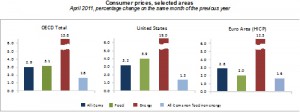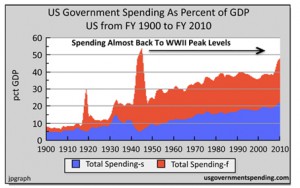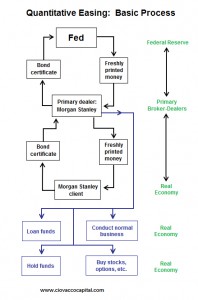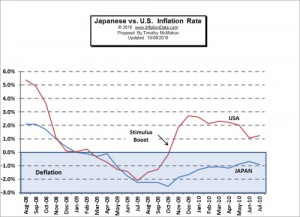In today's tumultuous economic climate, when we hear the term "inflation" we think money and a failing economy our minds immediately turn to expenses, debt, and money woes. Rarely, however, do our minds turn to college degrees and job prospects. On July 22, 2011 Laura Pappano from The New York Times published an article titled The Master's as the New Bachelor's. Introducing into the public mindset the concept of "credential inflation" and "degree inflation", this article has caused quite the hoopla in the academic world and many a panic attack among 20 somethings throughout the country. Pappano suggests that there is a certain amount of credential inflation occurring throughout the job … [Read more...]
Sheltering Cash From Inflation
When Inflation heats up it can ravage your cash holdings and so of course that is why a portion of your portfolio needs to be in inflation hedges. But a side effect of inflationary forces is the added volatility it adds to markets. Navigating this added volatility involves having flexibility in your portfolio and flexibility comes from cash or cash equivalents. Unfortunately, cash equivalents are big losers during periods of high inflation. So what do you do? Fortunately, there is a solution that will provide liquidity and prevent the major part of the purchasing power erosion due to inflation. Plus provide good returns in the mean time. In today's report the author of "Keep What You … [Read more...]
April Inflation Up in OECD Countries
OECD annual inflation continues rising to 2.9% in April 2011 The Organisation for Economic Co-operation and Development (OECD) released the April inflation numbers for its member countries today. Although we have known the U.S. inflation numbers for a couple of weeks now it is interesting to see how they compare to other developed countries around the world. Some of the biggest gainers were the United Kingdom (to 4.5% in April, up from 4.0% in March) and the United States (to 3.2%, up from 2.7%). Inflation also accelerated in Germany (to 2.4% up from 2.1%), Italy (to 2.6%, up from 2.5%), France (to 2.1%, up from 2.0%) and Japan (to 0.3%, after four consecutive months at 0.0%). Average … [Read more...]
Escaping the Great Depression – and Extending the Greater Depression
By Doug Casey, The Casey Report Here at Casey Research, our view of the Great Depression of the 1930s is a little different from that of most people. In our eyes, Franklin Roosevelt wasn’t a hero, he was a villain. Nearly everything he did served to extend and deepen the economic downturn. With the exception of supporting the 21st Amendment for the repeal of Prohibition, Roosevelt’s involvement in the economy was an unmitigated disaster. But in popular memory, that failure is obscured by U.S. success in WW2, over which Roosevelt presided. Today, unfortunately, Obama and his minions are taking Roosevelt as a model and are straining to repeat his mistakes. Because the distortions in … [Read more...]
US Economic Situation “Intractable”
Over the last few years we've often mentioned the situation that the government has gotten itself into and wondered how it was ever going to be able to get itself out. The speculation has been that a period of hyperinflation might be the only option. In today's article David Galland editor of the Casey report discusses the economic bind the government is in and just what options it has. ~Tim McMahon, editor By David Galland, The Casey Report In describing the current situation in these United States, and in many of the world’s other superpowers, we here at Casey Research have often used the word “intractable”… as in, “impossible to resolve.” While that may not be technically … [Read more...]
How the FED Prints Money – Part 2
Yesterday we looked at the process the FED uses to get the money "Out of Thin Air" and into the hands of people who can spend it. In other words the "how" they do this magic. Basically, that route is through special dealers and then it goes into a few select hands. Today we are not going to look at the "how" but instead we will look at "Who" gets the money and where it is likely to go from there. Because if we know where it is likely to go we can get there first and profit from the incoming cash flow. ~Tim McMahon, editor Quantitative Easing (QE2): Who Gets the Fed’s Printed Money? Part 2 of a 6 Part Video Series on Quantitative Easing: In Part 1: How the FED Prints Money, we … [Read more...]
Inflation in the U.S. vs. Japan
The end of 2008 was a massive disinflationary period as the inflation rate fell from lofty heights until in January 2009 the inflation rate had fallen in both the U.S. and Japan to about zero. Deflation followed as the rate fell below the zero line through July. But then the two countries started diverging as the massive trillion dollar bailout began kicking in in the U.S. It kicked the U.S. inflation rate up to almost three percent before petering out. The inflation rate stayed negative (deflationary) in Japan however as prices continued to fall by 1% to 2% per year, which is probably where the U.S. would have been without the trillion dollar stimulus. Inflation in the U.S. currently … [Read more...]
How You Can Help Take Money Creation Out of the Hands of the Government
Updated February 2014 We all whine and complain about it but usually there isn't much we can do about inflation. About our only choice is to vote with our feet, we can move our funds from one doomed currency to another. This is what the Forex industry is all about. The only other alternative to fiat currency is hard assets like gold. As I've said many times, the value of our money is based on the supply and demand fundamentals. Right now the demand for U.S. dollars is falling and the supply is rising because the government has the ability to create them out of "thin air". Based on basic Economics 101 this means that the value of the U.S. Dollar will continue to fall as long as the … [Read more...]
No Way Out
By Doug Casey, Casey Research I really dislike sounding inflammatory. Saying that things are going to go terribly wrong runs a risk of being classed with those who think the world will end in December 2012 because of something Nostradamus or the Bible says, or because that’s what the Mayan calendar predicts. This is different. In the real world, cause has effect. Nobody has a crystal ball, but a good economist (there are some in existence, though very few) can definitely pinpoint causes and estimate not only what their immediate and direct effects are likely to be (that’s not hard; a smart kid can usually do that) but the indirect and delayed effects. In the first half of this … [Read more...]
Understanding the FED
Protect yourself from the common and misleading myths about the U.S. Federal Reserve Over the years, occasionally I have received comments from subscribers about the SHAM of the FED and how U.S. Taxpayers are being swindled. And although I knew the truth of it, I was unable to shed any new light on the subject. Today our friends at Elliottwave have provided a new resource that will teach you everything you wanted to know – plus some things you might wish you didn't – about the U.S. Federal Reserve Bank. Since the Federal Reserve Act of 1913, the Federal Reserve Bank has been a secret, quasi-government agency. It's time to pull back the curtain on the Federal Reserve system. In … [Read more...]





